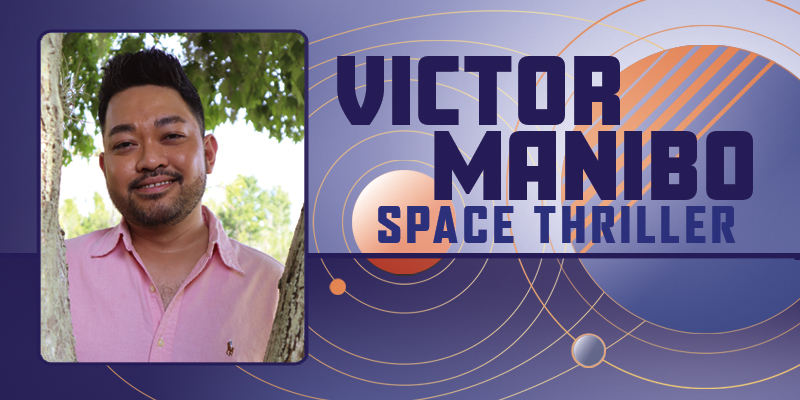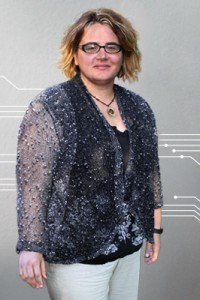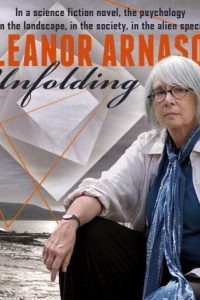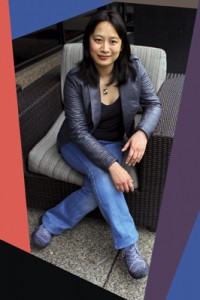Victor Manibo: Space Thriller
VICTOR MANIBO was born in Manila, Philippines where he lived until moving to Jersey City NJ at age 23 to attend law school. He graduated from Cardozo School of Law with a concentration in constitutional law and civil rights, and he works in private practice as an immigration lawyer.
Manibo’s debut SF noir novel, The Sleepless, was published in 2022, and his second book, Escape Velocity, will be published on May 21, 2024 by Erewhon Books. Manibo was selected as an Emerging Voices Fellow by Lambda Literary in 2022. He lives in Queens NY with his husband.
Excerpt from the interview:
“I started writing Escape Velocity after I had just finished polishing The Sleepless. At that point, I was really unsure about what to do next. I didn’t know what the process was after writing and revising a novel. I just knew I wanted to keep writing, I wanted to improve, and I wanted to tell a different story, so I just jumped into a new project. That was in late 2019. At the time I was very into Dennis Lehane’s Mystic River – I know that’s a weird inspiration for a science fiction novel. But the book – and the movie – is about childhood friends who share a deep, horrible secret that follows them into adulthood, and I thought that was a really rich premise. That became one of the big inspirations for Escape Velocity.
“Another inspiration – or, at least, the germ of the idea that came to me – comes from my fascination with these huge cruises for gay men called Atlantis Cruises. It’s thousands of gay men on this one boat for an entire week, and I thought that setting was such a fertile ground for the kinds of shenanigans I enjoy writing. Murder mysteries that take place in hotels or cruise ships are not new, but I thought, ‘Wow, I wonder what crazy things I can come up with set on an Atlantis gay cruise?’ And as a queer man, I always infuse my projects with queerness, so I decided to take that setting, and also take Mystic River and the architecture of that story, and then bring them together.
“Aside from those two things, the bigger cultural context in 2019 was that Knives Out had just come out, and Parasite came out and then won Best Picture. Questions about wealth and class were not only in the cultural conversation, but deeply important to me, as well, and those heavily inspired Escape Velocity.
“In the novels and short stories I write, there is always an undercurrent of class tension, because class is one of the most insidious ways that people are othered. In the Philippines, there aren’t a lot of ways to other our fellow Filipinos because it’s a fairly homogenous country in terms of race. Also, most of us are Catholic, and 92% of Filipinos speak the same language, so people are often stratified in terms of class. That was what I wanted to explore with Escape Velocity. The Sleepless was all about work, labor, and hustle culture and capitalism; those are all related to wealth and class, so I thought it made for a natural progression in terms of themes.
“The first two books had always been murder mysteries from my initial conception. The Sleepless is more traditionally a murder mystery because there is a dead body, the progress of an investigation, and then a solution that is revealed toward the end. Escape Velocity has similar beats, but they’re not presented as rigidly. Escape Velocity also has multiple points of view, two timelines, two dead bodies, and two mysteries, but aside from those, there’s much more going on in the characters’ personal lives. It doesn’t feel like a traditional murder mystery, but more like a combination of a murder mystery and a psychological thriller.
“With Escape Velocity, it was important for me to find that right balance, because I was juggling a lot of balls with this story. When I first structured the plot I had to figure out how to braid together two threads, two storylines. Because of all the elements I put in, I had doubts whether it would still feel like a murder mystery. Looking back at how it’s turned out, the murder-mystery feel is still there, but it’s not the strongest part of the book’s DNA. The mystery of what happened to the dead bodies is interesting and compelling, but there are other mysteries in the book that share equal time with the murders. Mysteries like: What is going on in this person’s head? What made this person this way? Writers who are smarter and more experienced than me have said, ‘Every book is a mystery because the reader is brought into a world and circumstances where there are these questions that need to be answered.’ How strongly those questions are answered, and how strongly the investigation of those questions is portrayed, are levers that can be moved and calibrated depending on what kind of story you want to write. Some of those levers are pushed to the max when it’s a murder mystery, with a very specific question at its core. With Escape Velocity, I was calibrating the levers in different ways. I hope that, in the end, it’s something that a murder mystery fan can still enjoy, but find other, more compelling, mysteries going on as well.
“Escape Velocity is centered on a group of four friends who go on their 25th high school reunion aboard a luxury space orbital. The friends are very well-off – they’re described in the book as the one percent of the one percent. They all come to this reunion with different ideas of how it’s going to go, and different goals – and, honestly, different feelings about each other, and about their school, and about their history, when they were still in high school.
“The first one we meet is Henry Gallagher, a pharmaceutical mogul and a doctor. In high school, he was basically a golden child – student council president, homecoming king. Everyone loved him, and he was popular but he wasn’t a jerk about it. He wasn’t the stereotypical ‘big man on campus.’ As a grown-up, he is still the same in a lot of ways. He runs a pharmaceutical company and he’s married to an entertainment exec – they’re a gay power couple, and they’re coming to the reunion because they want to advance their applications to live on Mars. At the beginning of the book, it’s established that habitats on Mars have been built, and the applications for civilians to live there are going to start soon, and there’s a ranking system on who gets to go to Mars. Henry is going to this reunion to broker a deal so his application and his husband’s application get priority, and they can get to Mars quicker.
“Next we meet Tom Lazaro, or Laz. He’s a Filipino-American who is the US ambassador to Chile. He is born of a political family: His father is a US representative, his grandfather is US senator for California, and he is, in his group of four, the meek, shy one. That might sound at odds with the fact that he’s supposed to be an ambassador and the face of the country, but that is his dynamic with his friends, if not necessarily his dynamic professionally. He’s coming to this reunion because he wants to court someone. He is in love with another person in the group, Ava, who runs one of the top investment banks in the world. Ava is a trans woman, and Laz has basically hounded her since they were in high school. Laz is still trying to get Ava and win her over after all these years, so that’s his goal.
“Ava is there because she’s trying to finally get answers about her brother’s death. Ava’s twin brother died when they were seniors in high school, and the circumstances of that death are a little murky. The reunion is the perfect opportunity for her to get some clarity because everybody’s going to be here. That’s of course at odds with her friends’ agendas, and I really enjoyed putting all these characters together and ramping up the tensions between their hidden and opposing agendas.
“Finally, we have Charles Sloane IV. He is the most colorful character of the four; I really had fun writing this character. He is a libertine, a hedonist who, at 40, is still a very much a party boy. He’s the kind of person who goes on an Atlantis gay cruise. Sloane is part of the one percent, but his family has fallen from grace. He has had to get by on his own, and the way he’s done that is sex work and blackmail and trading secrets. He’s going to the reunion to beef up his client list – and also to have fun, because that’s what he likes to do.
“I had a lot of fun writing these characters, but that initial cast didn’t allow me to delve into class or immigration – I can’t talk about these big, weighty things when all my characters are US citizen one-percenters. And so, even though the story opens with this lavish event and these wealthy personalities, the book also has other characters that don’t share that background. These are the service workers, the staff and crew of Space Habitat Altaire, where this reunion is taking place. We meet the head of guest relations, the valets and assistants, and a big chunk of the story is told from their point of view.
“In terms of craft, I really grappled with the changing points of view. I’m a real structure nerd – I love to think about structure and how that affects the reading experience, and how it also affects my own writing experience. I thought, ‘I’m going to have dual timelines, and five or six POVs, and that’s going to be easy. Surely I can pull that off for my sophomore novel.’ I found out very quickly how foolhardy that was. There were a lot of factors to consider in structuring the book this way: ‘Why am I telling this part of the story from this point of view? Is this person the best vehicle to deliver this information, or convey this emotion?’ And balancing that against the impulse of, ‘Well, I just spent ten pages with this character, so now I need to shift to a different character.’
“One of the major things I learned when writing this book was not to be married to structure too much, even though I am a structure nerd. It really should be about the best way to present the scene and reveal information to the reader. Who’s supposed to be speaking, and who needs to be there? From whose lens are we supposed to be viewing this scene? Balancing all these considerations was a real challenge, especially in terms of pacing. I wanted Escape Velocity to be well-paced without sacrificing the character work.
“I’m still learning to be comfortable with letting go of initial ideas, my initial plans, structures, outlines. It’s difficult because of my personality and the way I work in my professional life, which is more regimented. But I am discovering that the more I focus on what really serves the story the best, the easier it is to let go of plans and to make changes midway. Like, maybe the structure’s not going to be as neat as I conceptualized, but that’s fine if the story’s going to be stronger and more compelling.
Interview design by Francesca Myman
Read the full interview in the May 2024 issue of Locus.
 While you are here, please take a moment to support Locus with a one-time or recurring donation. We rely on reader donations to keep the magazine and site going, and would like to keep the site paywall free, but WE NEED YOUR FINANCIAL SUPPORT to continue quality coverage of the science fiction and fantasy field.
While you are here, please take a moment to support Locus with a one-time or recurring donation. We rely on reader donations to keep the magazine and site going, and would like to keep the site paywall free, but WE NEED YOUR FINANCIAL SUPPORT to continue quality coverage of the science fiction and fantasy field.
©Locus Magazine. Copyrighted material may not be republished without permission of LSFF.








